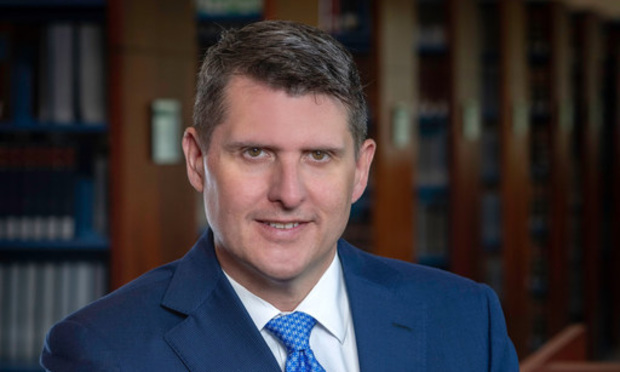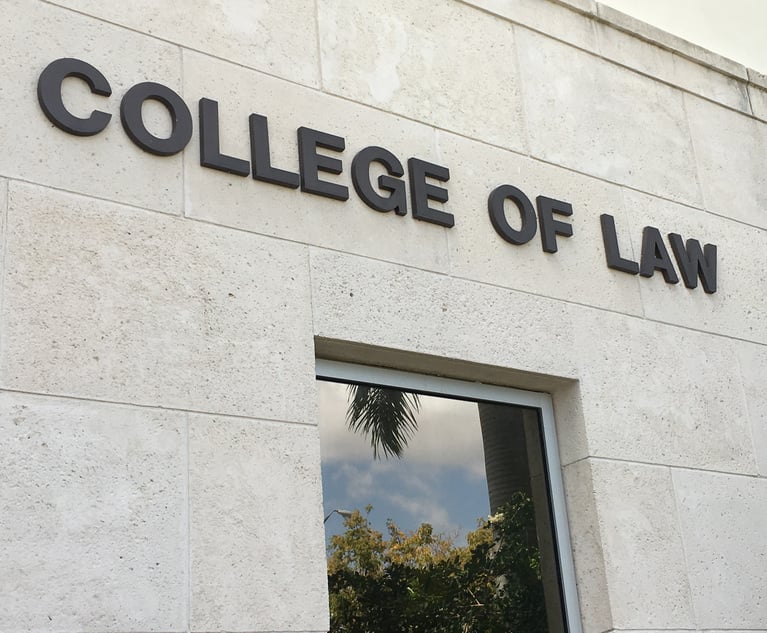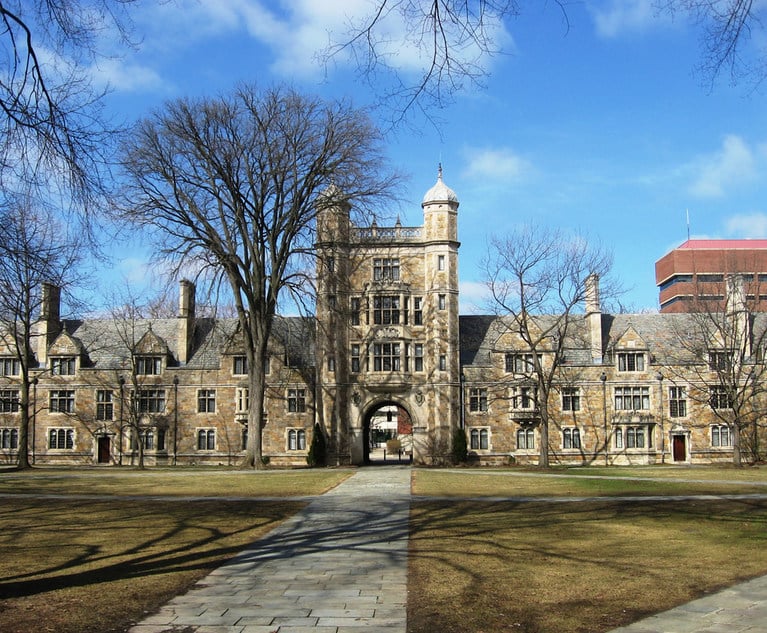Forget Daddy Day Care. At this School, It's Law Dean Day Care.
Creighton University School of Law dean Joshua Fershée earned props for offering to watch the children of students, staff, and faculty in his office when snow closed public schools in Omaha this week.
January 23, 2020 at 02:19 PM
4 minute read
 Joshua Fershee. (Courtesy photo.)
Joshua Fershee. (Courtesy photo.)
On Wednesday, three inches of slushy snow fell on Omaha, Nebraska—enough to close area schools and day cares across the city.
But Creighton University and its law school remained open, creating a conundrum for staff, faculty and students suddenly faced with the prospect of missing work and class to watch their kids.
That's when Creighton law Dean Joshua Fershee stepped in. He messaged the law school community to offer his child care services.
"While I'm not a licensed provider, I'm generally good with kids and would be happy to watch some little ones, if it helps," wrote Fershee, the father of 11-year-old daughter and a 14-year-old boy. "We'll figure it out."
It was an unusual offer from a dean, and one that caught the attention of fellow academics on Twitter.
"THIS is how you support families. THIS is inclusive leadership. THIS is how we transform legal education," tweeted Meera Deo, the director of the Law School Survey of Student Engagement and author of a new book on the challenges women—and particularly minority women—face in the legal academy.
Fershee didn't think it was a particularly radical idea when he sent the message out, he said in an interview Thursday. As a professor, he had long allowed students to bring their kids to his class when they were in a bind. But it's the first time he opened his office for child care since becoming dean last year.
"I was a little surprised by the reaction, since it's something I've done for a long time, but I guess it's the first time I've done it as dean," he said, acknowledging that he checked his schedule to make sure he didn't have any important meetings before offering to watch any kids—he didn't want the child care burden to fall on his executive assistant.
"The social media response suggests it's more rare than I would have thought."
Fershee is familiar with the anxiety that comes with the child care scramble. He and his wife, Creighton law professor Kendra Fershee, would sometimes bring their children to class with them during school closures or drop them at a friend's house, and it was often stressful, he recalled. Just knowing that students and faculty have the option for someone to watch their kids during classes can be enough to alleviate some of that stress, even if they don't ultimately take advantage, he noted.
"We want to make the education rigorous," Fershee said. "I don't want to make the process of getting it rigorous. That's what we should be making easier. I think the biggest takeaway would be, at a minimum, leadership needs to be appreciative of the challenges families face."
In the end, Fershee only ended up watching two elementary-age boys, though he was prepared to handle more. Other professors and students brought their kids to class with them, and some stopped by just to thank the dean for opening up his office if needed. His charges stayed occupied with construction paper, an extensive array of highlighters, and viewing reruns of the long-defunct kids show Captain Kangaroo with associate dean for student affairs Rick McFayden.
Fershee acknowledges the gender dynamics at play when it comes to child care, with women often assumed to be primary caregivers. That's one reason he felt it was important to step up during the school closure. Such an offer could be a trickier proposition for women deans, he noted, because they may not want to reinforce those societal child care expectations in the workplace.
"I would never say this is the right thing for anybody else," Fershee said. "Each circumstance is different. There are huge gender dynamics to that. For me, it's sending a different message than it would for someone else. But I'm glad it resonated."
This content has been archived. It is available through our partners, LexisNexis® and Bloomberg Law.
To view this content, please continue to their sites.
Not a Lexis Subscriber?
Subscribe Now
Not a Bloomberg Law Subscriber?
Subscribe Now
NOT FOR REPRINT
© 2025 ALM Global, LLC, All Rights Reserved. Request academic re-use from www.copyright.com. All other uses, submit a request to [email protected]. For more information visit Asset & Logo Licensing.
You Might Like
View All
Florida Law Schools Are Seeing a Bump in Applications for 2025, After Recent Declines at Flagship Schools
3 minute read

Law School Applications are Up Across the Country. Law Deans Aren't Sure Why
6 minute read
Librarian's Termination Violated First Amendment Protections, Lawsuit Claims
3 minute readTrending Stories
Who Got The Work
J. Brugh Lower of Gibbons has entered an appearance for industrial equipment supplier Devco Corporation in a pending trademark infringement lawsuit. The suit, accusing the defendant of selling knock-off Graco products, was filed Dec. 18 in New Jersey District Court by Rivkin Radler on behalf of Graco Inc. and Graco Minnesota. The case, assigned to U.S. District Judge Zahid N. Quraishi, is 3:24-cv-11294, Graco Inc. et al v. Devco Corporation.
Who Got The Work
Rebecca Maller-Stein and Kent A. Yalowitz of Arnold & Porter Kaye Scholer have entered their appearances for Hanaco Venture Capital and its executives, Lior Prosor and David Frankel, in a pending securities lawsuit. The action, filed on Dec. 24 in New York Southern District Court by Zell, Aron & Co. on behalf of Goldeneye Advisors, accuses the defendants of negligently and fraudulently managing the plaintiff's $1 million investment. The case, assigned to U.S. District Judge Vernon S. Broderick, is 1:24-cv-09918, Goldeneye Advisors, LLC v. Hanaco Venture Capital, Ltd. et al.
Who Got The Work
Attorneys from A&O Shearman has stepped in as defense counsel for Toronto-Dominion Bank and other defendants in a pending securities class action. The suit, filed Dec. 11 in New York Southern District Court by Bleichmar Fonti & Auld, accuses the defendants of concealing the bank's 'pervasive' deficiencies in regards to its compliance with the Bank Secrecy Act and the quality of its anti-money laundering controls. The case, assigned to U.S. District Judge Arun Subramanian, is 1:24-cv-09445, Gonzalez v. The Toronto-Dominion Bank et al.
Who Got The Work
Crown Castle International, a Pennsylvania company providing shared communications infrastructure, has turned to Luke D. Wolf of Gordon Rees Scully Mansukhani to fend off a pending breach-of-contract lawsuit. The court action, filed Nov. 25 in Michigan Eastern District Court by Hooper Hathaway PC on behalf of The Town Residences LLC, accuses Crown Castle of failing to transfer approximately $30,000 in utility payments from T-Mobile in breach of a roof-top lease and assignment agreement. The case, assigned to U.S. District Judge Susan K. Declercq, is 2:24-cv-13131, The Town Residences LLC v. T-Mobile US, Inc. et al.
Who Got The Work
Wilfred P. Coronato and Daniel M. Schwartz of McCarter & English have stepped in as defense counsel to Electrolux Home Products Inc. in a pending product liability lawsuit. The court action, filed Nov. 26 in New York Eastern District Court by Poulos Lopiccolo PC and Nagel Rice LLP on behalf of David Stern, alleges that the defendant's refrigerators’ drawers and shelving repeatedly break and fall apart within months after purchase. The case, assigned to U.S. District Judge Joan M. Azrack, is 2:24-cv-08204, Stern v. Electrolux Home Products, Inc.
Featured Firms
Law Offices of Gary Martin Hays & Associates, P.C.
(470) 294-1674
Law Offices of Mark E. Salomone
(857) 444-6468
Smith & Hassler
(713) 739-1250








